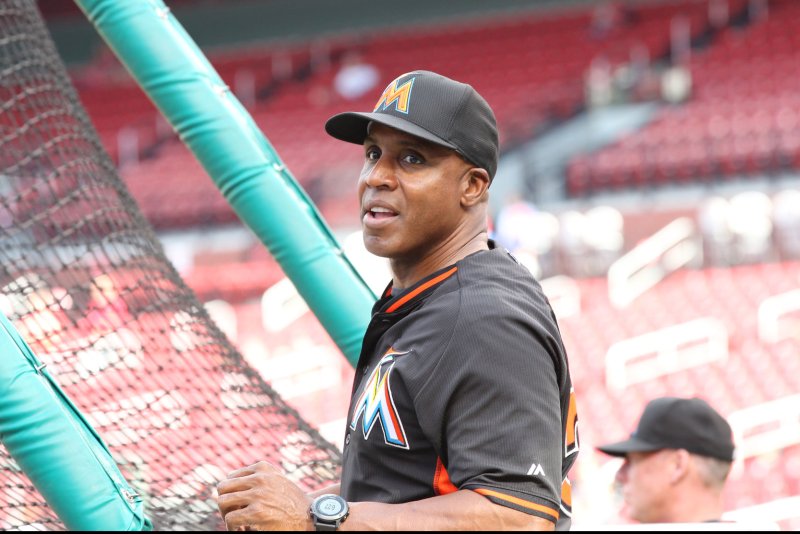1 of 3 | Miami Marlins batting coach Barry Bonds watches batting practice before a game against the St. Louis Cardinals at Busch Stadium at Busch Stadium in St. Louis on July 15, 2016. Photo by Bill Greenblatt/UPI |
License Photo
If you love baseball and care about the Hall of Fame, it is time to familiarize yourself with a principle called "The Observer Effect."
It is chronicled in science, but it is about to be a real thing in baseball. It could shape who ends up with a coveted spot in the sport's shrine in the coming years.
The basic idea is that a process is changed when we are able to see it. This comes into play next year when the secret balloting by members of the Baseball Writers Association of America for the Hall of Fame becomes public. On the next ballot, every voter's choices will be revealed and open to scrutiny.
Plenty of ballots were made public before Wednesday night's announcement that Jeff Bagwell, Tim Raines and Ivan Rodriguez were ticketed to be enshrined. But the difference between the vote totals that were public and final tallies was telling. And, as interesting as the candidacies for Barry Bonds and Roger Clemens were already, they may be much more so next year.
First the news on those two: Out of 442 votes and with 332 (75 percent) needed, Clemens got 239 (54.1 percent) and Bonds got 238 (53.8 percent). Each, in his fifth year, is up almost 10 percent. Of 14 new voters we know about, 13 picked both.
The thing here is the difference between the choices of voters who went public with their selections and voters who stayed private. Just before the results were announced, there were 250 voters who revealed their ballots, and Bonds was at 64.4 percent and Clemens at 63.2 percent. Clearly, many of the voters who resisted scrutiny by the general public left them off. Here's a theory as to why.
Every voter who went public, either by posting on social media or writing about it or turning it in to one of the trackers, likely received a reaction. The experience here was a fusillade of responses, some approval but more than half who were upset with an omission. Angry people like to speak out, especially with the cover of social media anonymity. There is no doubt that the scrutiny played a role.
Most voters don't want their choices torn apart. Was that the case for the majority who left Clemens, Bonds or both off their ballots? It remains to be seen. Will being outed with their ballots move the vote totals?
It might.
And that is why watching the tallies for Bonds and Clemens next year is so interesting.
Given the enormity of circumstantial evidence that those two used performance-enhancing drugs, it is clear the electorate initially didn't want to give them a pass. Many voters felt voting for them insulted the game's integrity. Some were looking for the Hall of Fame to take a position. Some hoped for more information. And others decided to withhold their votes for a period of time to communicate their disapproval.
Next year, everyone will be watching. How the electorate responds to that could be extremely interesting.
There is another thing. Raines didn't make the cut for nine seasons. In his final year on the ballot, he got in overwhelmingly (though for transparency, without this vote). Many voters who hadn't selected Raines in years past went for him on his final chance.
Some voters are comfortable with the public seeing them change position on a player; the decision here was to include Bonds and Clemens this year because they were superior to others from their era voted in despite suspicion of drug use. But how will the electorate feel about changing their disposition in the disinfecting sunlight?
Once the voting is entirely public, will voters resist the public calling them a "flip-flopper" by doing what so many did this year with Raines?
Next year may be the best chance Bonds and Clemens have to get in.
How the electorate changes -- new voters are taking a softer stance on those from the so-called "PED era" -- is an unknown. Some of the hardliners are removed from covering the game and will have their voting rights expire.
Trevor Hoffman, a bellwether for closers, came up five votes short this time around. But maybe the biggest injustice in this year's Hall of Fame voting is that Vladimir Guerrero didn't get in. His credentials are impeccable, and he carries no taint of PED use, but he was still 15 votes shy. Both are likely to get in with first-year nominees Chipper Jones and Jim Thome next year.
Bonds and Clemens? The guess here is that they don't get in next season but they come within a couple dozen votes of qualifying. Tainted as they are, they both probably will get in eventually. But if the bump isn't there next season -- with every vote there for the fans to dissect -- maybe the writing will be on the wall.
"The Observer Effect" could be very much on play in the coming year.















